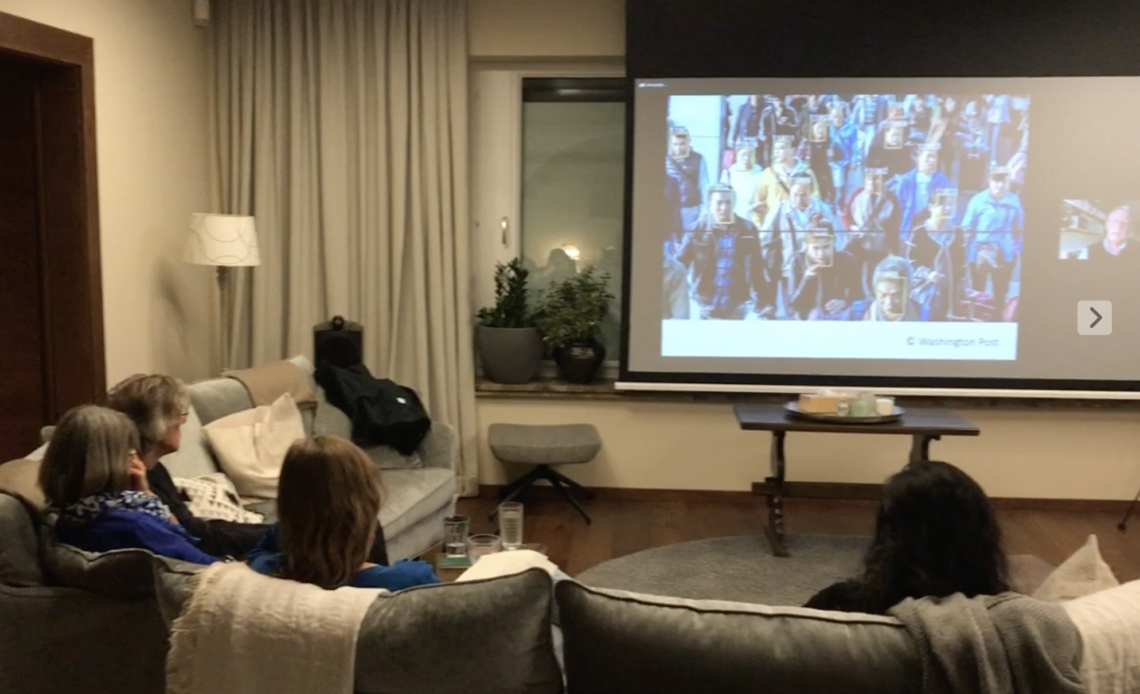
On the 29th of October, the Quo Vadis Institutes’ Annual Consultation was held as a hybrid event, with attendance both online and at the newly opened QVI house in Salzburg. This year, the consultation focused on questions related to Artificial Intelligence, the flourishing of humanity, and the possible future of humanity – inspired by the book The Robot Will See You Now, which came out earlier this year. We had the honor of hearing from Prof John Wyatt, one of the book’s editors, and Prof Nigel Cameron, a specialist on the intersection of ethics, theology, and technological advancements.
Prof John Wyatt

Prof Wyatt, who besides being one of the book’s editors also wrote two of its chapters, opened the discussion for us. Prof Wyatt is Emeritus Professor of Ethics and Perinatology with University College London, and Senior Researcher at the Faraday Institute for Science and Religion in Cambridge. He is an expert in the interface between medical ethics, technology and Christianity, and is currently leading a research project on the social, ethical and theological implications of advances in artificial intelligence and robotics.
In his talk, Prof Wyatt outlined some of the main questions surrounding AI, but also spoke more on the type of posture required of people living in a world filled with intelligent machines. As many aspects of the use of AI seem innocent or they open ethical question to which no clear mechanisms have been developed yet, Prof Wyatt encouraged us to stay informed and careful in our increasingly technologically inundated world. His main points on the influence of AI can be summarised with the following four topics:
- What does it mean to be human? Prof Wyatt’s own background in neonatology has brought him face to face with difficult ethical questions, which were often grounded in the way we understand what a human being, in essence, is and how that should influence our praxis. Similarly difficult and complex questions can now also be seen in the world of robots and the development of AI. Over the centuries, humans have likened themselves to the newest inventions to visually represent their own complexity – when steam-engines were invented, for instance, people thought “human beings function like steam-engines!” But now, as we are compared to our most advanced technology (AI), how does that change how we see ourselves?
- Surveillance capitalism. Our data is being constantly extracted, analysed, and used for profit. While people in Europe and the US are being tracked in order to be “better consumers”, in some places people are being monitored and socially controlled through facial recognition technology. How do we thrive in this culture – and what can we do about it?
- Simulated Persons. Our lives are being infiltrated by simulated persons – Alexa, Siri, and Chatbots in online stores that help you find the right product, just to mention a few. These are and can be very helpful – and there are people who prefer the simulated company or assistance rather than speaking with a real person. However, the fun of talking with a chatbot, or the innocence of a childlike robot, can hide the fact that they are powered by a powerful supercomputer, which ultimate end is often to gather our data. Beyond the challenges of simulated persons, we also know the dangers of online anonymity, resulting in cyber-bullying, trolls, etc.
- Techno-optimism. In conclusion, Prof Wyatt cautioned for blind techno-optimism. It can create a vision or hope of the future in which every aspect of our lives becomes frictionless, all longings and desires are satisfied effortlessly. But can physically embodied humans flourish and find meaning and fulfillment in that kind of a future? In this current world, human beings seemingly need some level of resistance, friction, or struggle in order to flourish and for our characters to be built. This creates a deep paradox. Is the frictionless future that the digital world is promoting actually one where humans can flourish?
Prof Wyatt mentioned the following questions to think about moving forward:
- What can we learn about humans from the development of AI?
- What does it mean to be a person?
- What are the possibilities and threats?
- How can we defend the dignity and fundamental rights of Human beings?
- What is the end game and telos of AI, what is the digital future we are building and how can humans flourish in that?
Prof Nigel Cameron

Our second speaker, Prof Nigel M. de S. Cameron, is President Emeritus of the Center for Policy on Emerging Technologies in Washington, DC, a former Technology Editor at UnHerd.com, and a regular advisor to government departments, unions, and companies on the future of work in the age of robotics and automation. He has also written extensively on this topic, including a chapter in The Robot Will See You Now.
During the Consultation, Prof Cameron spoke about the effect of technological advancements on the labour market. Since the industrial revolution, people have feared that machines will take their jobs, and Prof Cameron believes that this is becoming a more legitimate fear today, due to the developments in AI. Granted, every advancement creates new jobs, however at this point, it may seem that technology will outrun the pace at which those new jobs can be created. This likely possibility will bring about massive societal change – for example, the deconstruction or reorientation of our notion of “full time” work. Are we prepared for this and, if not, how can we prepare for this? How can one work on mechanisms now to make sure that when such a shift occurs, societies can cope?
Another question Prof Cameron discussed was what types of timeframes are used when people think about the ‘future of humanity.’ Often, one tends to look at the next 10-15 years, when contemplating the future, but humans may be around for another hundred thousand, million, or even billion years. And in this time, technology is only going to continue to expand and develop. Prof Cameron suggested a “Risk View” approach to public life – which most people apply to their private lives anyway (everyone has house insurance even though houses rarely burn down). In the same way, even if chances of a particular outcome are small, these scenarios must be prepared for and thought about. The changes that AI and technology will bring about will happen, whether we are prepared for them or not – but of course the outcome of those changes will be better if we are well prepared and thoughtfully engage.
Questions to think about:
- What are the effects of technological advances on the labour market?
- What should be focused on when thinking about humanity in the years to come?
- We were delighted to be able to organise this event. The inputs were followed by a good Q&A and further discussion, especially focused on the ways in which people today can translate their growing awareness of the challenges of AI, to practical changes.
Closing
QVI is also happy to announce the organisation of a Study Group, looking at The Robot Will See You Now. More information on this will be published soon, but if you would like to receive invitations to these events via email, please subscribe to the Newsletter letter here.
Photo: QVI Hybrid Annual Consultation 2021
Author: Rebekka Turkanik

